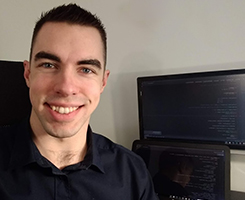Sean's Internship Story
Sean Pentinga (Bsc'19 Honors Specialization in Physics and Minor in Computer Science).
Sean spent his first three years at Western studying astrophysics and then took the next year off from studies to complete a 16-month internship with the Science Internship Program. His placement was at the London Regional Cancer Program under the supervision of Dr. Aaron Ward. There, he researched the effects of a new form of lung cancer treatment and presented work at various scientific conferences.
About his internship, Sean says, "the experience was enriching, rewarding, and helped embellish my degree greatly. Upon my return to school to complete my fourth year I changed my degree to physics and decided to add on a fifth year to complete a minor in computer science." Currently, Sean is now working in the IT field in Toronto.
Read Sean's story to see how he has added value to his degree and engaged in Work Integrated Learning to leverage his knowledge and skills to prepare for his next career move.
Sean's Story:
 My internship experience added a lot of value to my degree and resume in many areas. Before my placement, I had only limited experience with computer science and over the 16 months of my internship, I built a software tool from scratch to help with the research at the lab where I worked. I was also able to attend many scientific research conferences where I not only got to present my work but also to interact with and learn from other people in the academic community.
My internship experience added a lot of value to my degree and resume in many areas. Before my placement, I had only limited experience with computer science and over the 16 months of my internship, I built a software tool from scratch to help with the research at the lab where I worked. I was also able to attend many scientific research conferences where I not only got to present my work but also to interact with and learn from other people in the academic community.
The internship allowed me to refine many skills in computer science, academic research, team collaboration, and communication to name a few. I started the internship not knowing really what I wanted to do but knowing that research interested me. I ultimately decided that medical research was not my passion but I still love research and am looking forward to potentially doing more of it in other fields.
In my time at Western, I added computer science to my degree halfway through my degree specifically to benefit my career outlook. Physics majors learn many useful transferable skills such as data analysis, numeracy, and problem-solving, but adding rigorous computer programming skills helped my career prospects even further. The courses I took throughout my degree helped me learn many things in a theoretical sense but the internship really made the skills I had been learning become real which to me was probably the most valuable thing I took away from my degree.
The first thing to note about the internship program experience is that it is different for almost everyone who takes it. After the foundational training phase in third-year (resume writing skills, interview skills, etc.), you (hopefully) get hired and once you are, your experience will be very individual. My situation was particularly unique because I was doing research in a lab at Western whereas most students are hired with other companies. But in the most general terms, interns can expect to get experience in the workforce where they are usually seen by their colleagues as just other employees rather than temporary interns which can be invaluable.
What surprised me was how many skills related to the workforce are not taught in the traditional academic stream. Internships and research placements and part-time jobs help greatly. School is a lot of work but it only teaches you a small part of the puzzle.
Staying motivated throughout the duration of my degree proved to be a challenge. It helped to break it up by having a year off to work the internship. When I came back to school I had renewed energy and motivation. Adding computer science on top of my physics studies after my internship also helped as I got to study something different and use a different area of my brain.
Upon graduation, I had earned an honors degree in physics with a minor in computer science and was ready to start my career in the technology industry. Upon graduation, I was very confident that I had skills to apply in the workforce and my internship experience played a large part in that.

